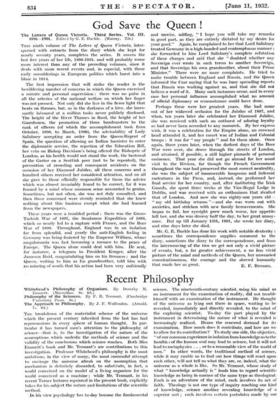God Save the Queen
The Letters of Queen Victoria. Third Series. Vol. Of . 1896-1901. Edited by G. E. Buckle. (Murray. '25s.) Tins ninth volume of The Letters of _Queen Victoria, inter- spersed with extracts from the diary which she kept for nearly seventy years, completes the series. It covers the last five years of her life, 1896-1901, and will probably rouse more interest than any of the preceding volumes, since it deals with more recent events and, in especial, with those early smoulderings in European politics which burst into a blaze in 1914.
'The first impression that will strike the reader is the bewildering II:umber of concerns in which the Queen exercised a minute and personal supervision : there was no pulse in all the arteries of the national welfare on which her finger was not pressed. Not only did she live in the fierce light that beats on thrones, but, as in the darkness of a hive, she inces- santly laboured at a million tasks never publicly disclosed. The height of the River Thames in flood, the height of her Guardsmen, the promotion of three bandmasters to the rank of officers (of which the accomplishment took from October, 1898, to March, 1900), the advisability of Lady Salisbury accepting an order from the Queen-Regent of Spain, the question of allowing an Indian barrister to enter the diplomatic service, the rejection of the Education Bill, her veto on Bishop Davidson's being offered the Bishopric of London, as his health would not stand the work, the bestowal of the Garter on a Scottish peer (not to be repeated), the prevention of crowding and consequent accidents on the occasion of her Diamond Jubilee, all these concerns and a hundred others received her considered attention, and on all she gave to those officially responsible for them the advice which was almost invariably found to he correct, for it was framed by a mind whose common sense amounted to genius. Sometimes, but not often, she was not duly consulted, and then those concerned were sternly reminded that she knew nothing about this business except what she had learned from the newspapers.
These years were a troubled period : there was the Greco- Turkish War of 1897, the Soudanese Expedition of 1898, which so nearly led to a rupture with France, and the Boer War of 1899. Throughout, England was in an isolation far from splendid, and yearly the anti-English feeling in Germany was being fostered by the Emperor William, whose megalomania was fast becoming a menace to the peace of Europe. The Queen alone could deal with him. Ile sent, for instance, a telegram to President Kruger, after the Jameson Raid, congratulating him on his firmness ; and the Queen, writing to him as bis grandmother, told him with no mincing of words that his action had been very unfriendly and unwise, adcTmg. I hope you will take my remarks in good part, as they are entirely dictated by my desire for your good." Again, he complained to her that Lord Salisbury treated Germany in'a high-handed and contemptuous manner : she forwarded to him Lord Salisbury's complete refutation of these charges and said that she "doubted whether any Sovereign ever wrote in such terms to another Sovereign, and that Sovereign his own grandmother, about their Prime Minister." There were no Mere complaints, lie tried to make trouble between England and Russia, and the Queen informed the Czar saying that he was busy spreading reports that Russia was working against us, and that she did not believe a word of it. Many such instances occur, and in every case her personal influence accomplished what no amount of official diplomacy or remonstrance could have done.
Perhaps these were her greatest years. She had come out of her widowed seclusion for the Jubilee of 1887, and when, ten years later she celebrated her Diamond Jubilee, she was received with such an outburst of adoring loyalty as had never been accorded to any monarch. By her express wish, it was a celebration for the Empire alone, no crowned head attended it, and her escort was of Indian and Colonial troops : it was for "my people" and for them alone. Once again, three years later, when the darkest days of the Boer War were over, she drove through the streets of London, and attained, if possible, a still higher pinnacle of personal eminence. That year she did not go abroad for her usual visit to the Riviera, for though the French Government throughout the war had preserved the most correct rieutrality, she was the subject of innumerable lampoons and indecent caricatures in the Press, and, instead, she performed her final service for her country, and, after instituting the Irish Guards, she spent three weeks at the Vice-Regal Lodge in Dublin, and was received with an enthusiasm that rivalled that of London. And now she was eighty-one years old- " my old birthday returns "—and she was worn out with anxieties, and stricken with new family bereavements. She began to fail, her eyesight grew much worse, her appetite left her, and she was drowsy half the day, to her great annoy- ance. But up till January 13th, 1901, she wrote her diary, and nine days later she died.
Mr. G. E. Buckle has done his work with notable dexterity : sometimes the correspondence supplies comment to the diary, sometimes the diary to the correspondence, and from the interweaving of the two we get not only a vivid picture of events, but, a far greater achievement, a no less vivid picture of the mind and methods of the Queen, her unwearied conscientiousness, the courage and the shrewd humanity


































 Previous page
Previous page